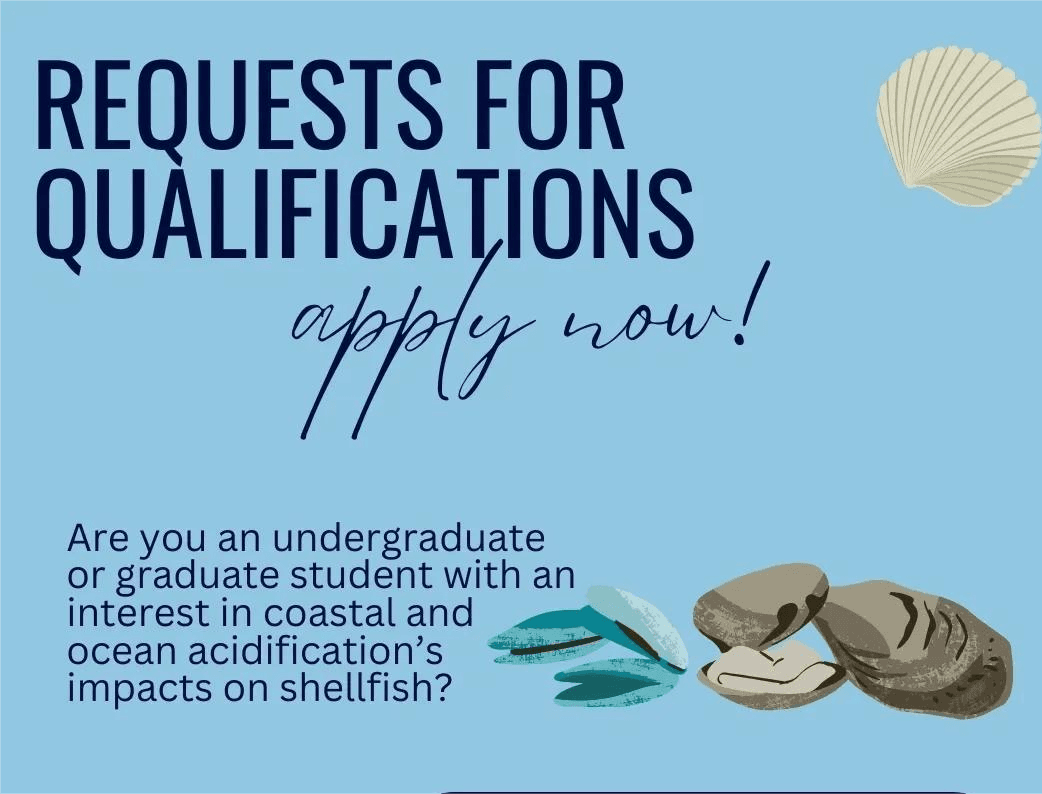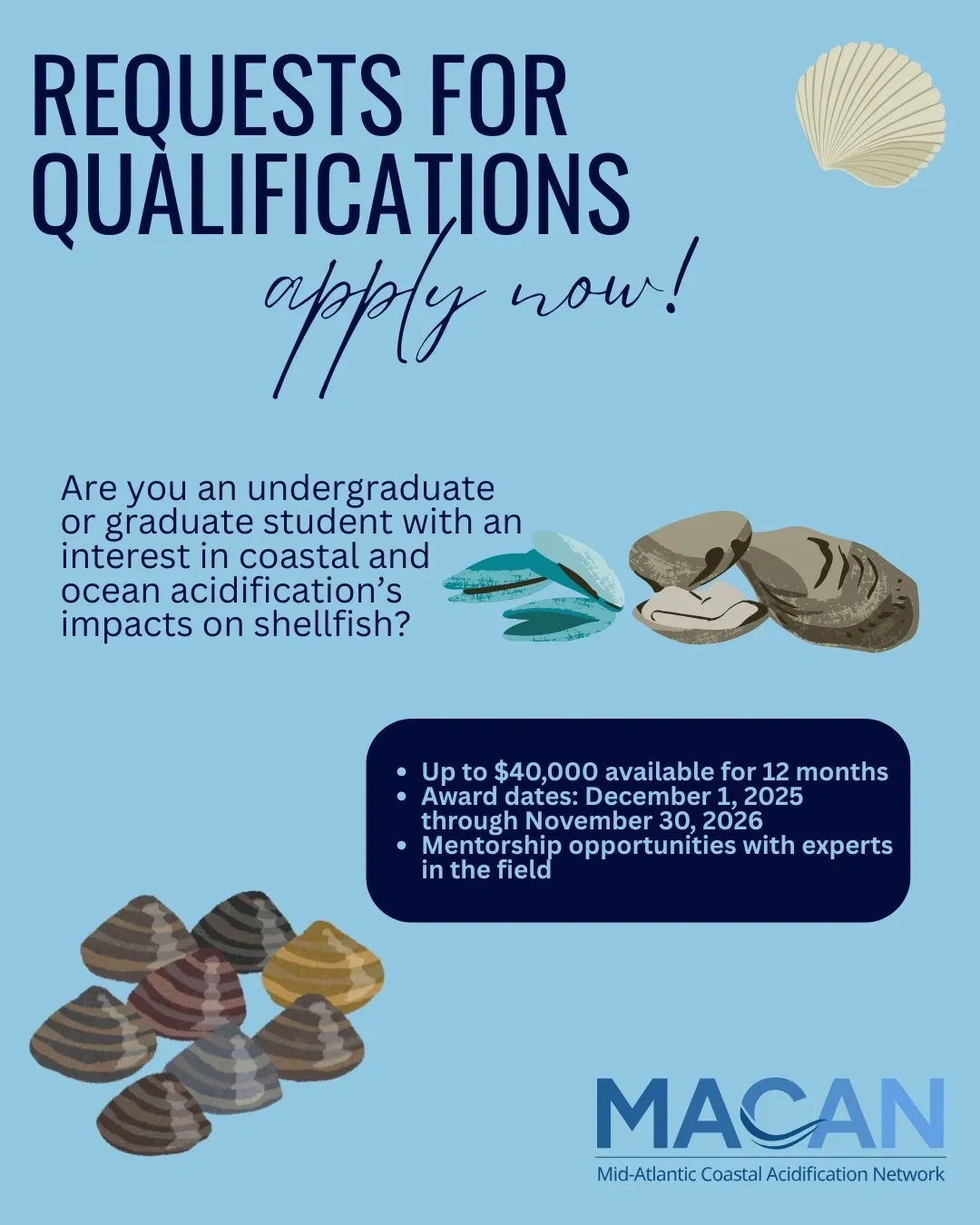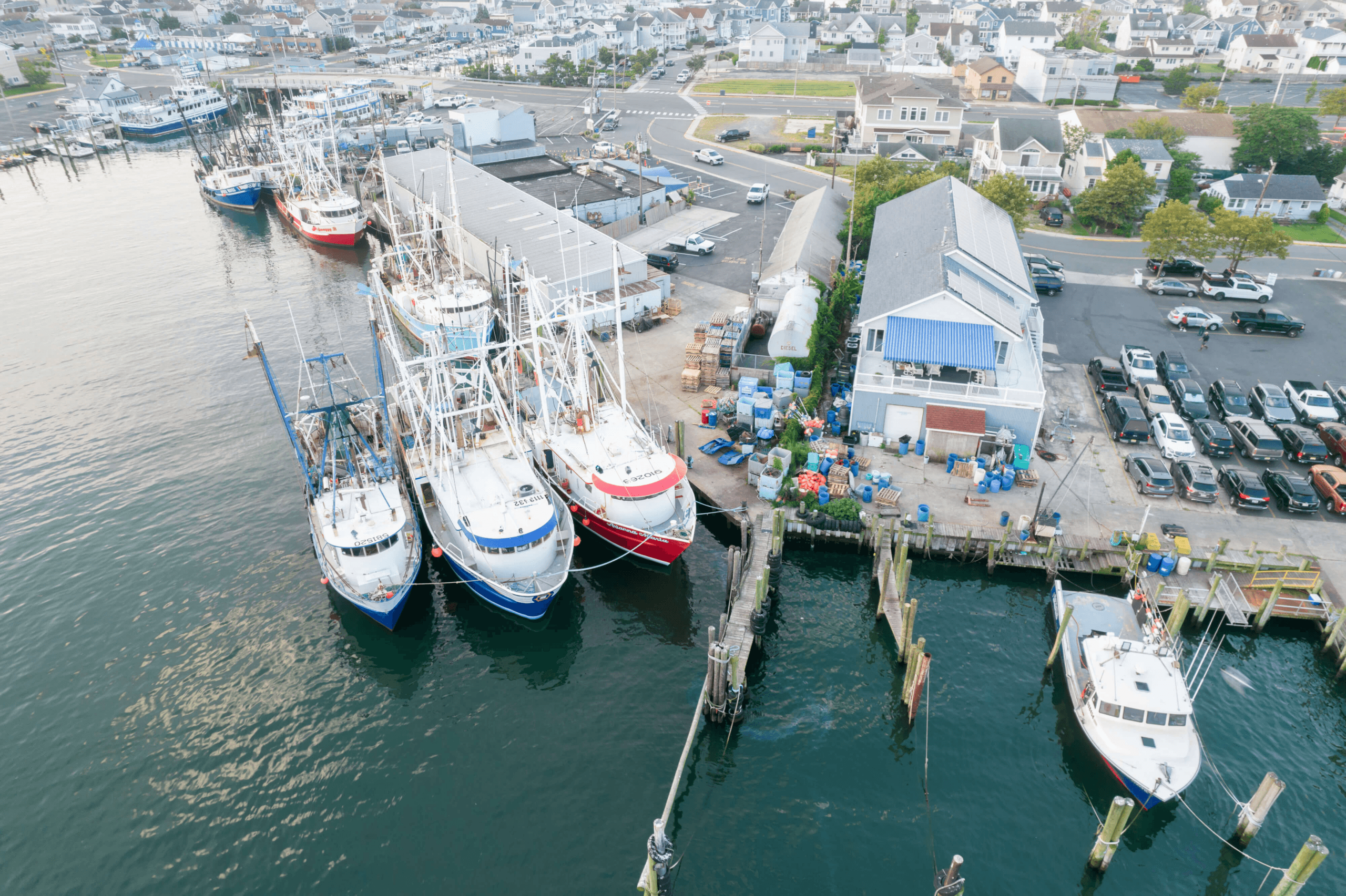Workforce Development Fellowship: Request for Qualifications

Background and Fellowship Overview
MACAN (the Mid-Atlantic Coastal Acidification Network) is a virtual network of researchers, educators, decision-makers, industry representatives, policy experts, and federal, state, local, and tribal leaders whose mission is to advance knowledge and understanding of the effects of coastal and ocean acidification (COA) and promote regional collaboration to advance this knowledge. This fellowship is designed to introduce students to the field of Coastal and Ocean Acidification, including, but not limited to, aspects of scientific research, policy, industry, education, and/or outreach related to COA.
MACAN’s fellowship aims to provide an immersive, real-world learning opportunity within the field of COA. This fellowship is also intended to support a project(s) that builds on the activities outlined in the MACAN 2024-2028 Workplan. The student will interact with one or more mentors to learn about the fundamentals of coastal and ocean acidification (COA) science, policy, industry, education, and outreach. The focus of the fellowship should be data compilation and analysis, with additional creation of outreach and education materials determined by the fellow in consultation with appropriate partners and mentors.
Shellfish are an important economic driver, cultural staple, and ecological resource in the Mid-Atlantic. In 2023, commercial landings of Atlantic Sea Scallops were valued at $360 million and landings of Atlantic Surfclams were valued at $34.4 million, while in 2022, landings of Ocean Quahogs were valued at $12 million. The Mid-Atlantic also has a rich history of shellfish harvesting. Indigenous tribes including the Shinnecock, Lenape, Piscataway, and Nanticoke continue to harvest quahogs for consumption and the creation of wampum. Oysters, clams, scallops, and other shellfish provide environmental benefits, including water filtration, stormwater buffering, and creating reefs that provide habitat for other creatures. They also serve as carbon sinks, mitigating the impacts of changing ocean chemistry by sequestering carbon and filtering excess nutrients and pollution in the water column.
However, shellfish face population-level risks due to hypoxia as well as factors such as degradation of the substrate on which they live, overfishing, hypoxic conditions, pollution, and coastal and ocean acidification (COA). The impacts of COA on commercial shellfish fisheries are not yet well understood. Through this fellowship, students will design a research project that aligns with priorities of the Mid-Atlantic Fishery Management Council, which manages Atlantic Surfclams and Ocean Quahogs, and the New England Fishery Management Council, which manages sea scallops (see pages 49-50), as well as those defined by NOAA and other research projects. Projects investigating early life stages and sublethal impacts will be given additional consideration.
Students will be required to work with a mentor(s), determined through consultation with MACAN, and produce a final product(s). This product(s) could include, but is not limited to, outreach materials, a final paper, a poster presented at a meeting, and/or a digital data product/tool (e.g. data layers on the Mid-Atlantic Ocean Data Portal). Some travel in the Mid-Atlantic region will be required, and the costs will be covered by the award. Travel opportunities will be determined during project development with MACAN and could include visits to research laboratories, professional conferences, fishery management meetings, or other mentoring opportunities. It is expected that the student will compile relevant fisheries data, including latitude and longitude information, that will be used to build GIS data layers on The Mid-Atlantic Ocean Data Portal. No prior GIS experience is required.
Potential desired outcomes include information and deliverables that can be used to help assess the impacts of COA on shellfisheries, information about impacts to species related to COA, and economic impacts from COA on shellfisheries. Potential desired deliverable products include data layers for The Portal, a webinar, and media materials.
A monthly stipend will be provided to the student through a contracting process directly with the student or academic institution. Period review of the student’s progress will occur to ensure that the project is progressing on the pre-determined timeline during the contracting process.
Students enrolled in a two-year, four-year, or graduate program are eligible; post-graduate students are not eligible. This fellowship could be used as an internship if the student’s program allows it.

Availability of Funds
Through Bipartisan Infrastructure Law funding from the Mid-Atlantic Regional Council on the Ocean (MARCO), MACAN is offering one-year fellowship opportunities for up to two students, contingent upon the release of funding. The fellowship will be a maximum of $50,000, which will be used to cover:
- The final stipend offer amount (up to $40,000) of the reward will be determined by the review committee and will also reflect if the student is at the undergraduate or graduate level;
- Indirect university costs, which vary by institution and will be determined by MARCO during the contracting process if the student elects to receive the stipend through their respective institution; and
- Up to $5,000 (included in the total $50,000) for other direct expenses and travel, including but not limited to publication costs, outreach material, and software, which will be determined during the first month of the performance period during the project scoping.
- Up to $5,000 (included in the total $50,000) for other direct expenses including but not limited to publication costs, printed materials, and software needed to complete capstone. This cost will be determined during the interview process, prior to writing the contract.
The Fellowship performance period is from December 1, 2025 through November 30, 2026.
Laboratory and fieldwork will not be supported by this project. Additionally, any data that is used must either be obtained from a designated mentor(s) or a publicly accessible data repository.
MARCO will also reimburse the student for travel expenses, which will be determined by MACAN staff with input from the student and mentor(s) during the fellowship performance period.
This fellowship will be awarded by the Coastal States Stewardship Foundation (CSSF) on behalf of MARCO and MACAN, and could be administered through the institution where the student is enrolled or CSSF.
Timeline
It is expected that the overall fellowship goals, objectives, and final deliverable products (Scope of Work) will be developed with MACAN within the first month of the performance period and the final product delivered by the end of the performance period. Scoping will also include tutorials of the Mid-Atlantic Ocean Data Portal and OceansMap.
Through the next nine to 10 months, the student will complete the project and work with mentors, complete any determined travel.
In months 11 and 12, it is expected that the student will develop the public-facing project deliverables.
Scope of Work
The scope of work of the fellowship will advance one or more of the activities outlined in the MACAN Workplan in respect to shellfish industry issues, and at a minimum will include:
- Development of a capstone project, including a description of final expected deliverables from the project, expected travel, and potential publication if applicable
- The capstone project should be one of the following: outreach materials, a final paper, a poster presented at a meeting, or a digital data product/tool
- Compilation of fisheries data into a matrix to be used for GIS data layers
- Regular communication between the selected Fellow(s) and (a) mentor(s) - identified in partnership with MACAN - that will advise on their final project process, delivery, and publication if applicable
- Attendance during bi-weekly MACAN staff meetings as needed
- Attendance during quarterly MACAN Steering Committee meetings as needed
- Presentation of the final project during a MACAN-sponsored webinar
Predesignation of a mentor(s) is not required, however, if the applicant has someone in mind, the proposed mentor(s) is welcome to submit a letter of support on behalf of the mentee(s) explicitly stating the mentor(s) willingness and commitment to participate in all aspects of the above scope of work. MACAN will provide mentorship throughout the course of the project through its network of collaborators.
Eligibility Requirements:
- Undergraduate or graduate students currently enrolled in a two- or four-year college or university for the duration of the project period,
- Applicant must be eligible to work in the United States
- Applicant must be able to devote, on average, at least eight hours per week to fellowship activities as listed in the scope of work
- Preference will be given to students with research interests in the Mid-Atlantic (NY, NJ, DE, MD, VA)
Application Requirements
- Written statement (maximum two pages) addressing the questions:
- What interests you most about COA and shellfish?
- What prior experiences do you have with COA? Some prior basic knowledge is required.
- How has your background or life experience influenced your research and/or career interests?
- How do your interests relate to MACAN’s work/workplan?
- How will this fellowship further your career goals?
- Maximum two-page resume demonstrating some COA experience and data compilation
- Most recent unofficial transcript from the institution where the student is enrolled at the time of application
- At least three faculty and/or professional references who will complete a recommendation form to be sent directly to them. It is the students’ responsibility to make sure the recommendation is complete for eligibility.
Please note, an interview will be required upon review of application materials for final candidates. Additionally, the student must provide an official transcript at the time of acceptance if requested.
Applications are due by September 21st at 11:59 pm, 2025. Students will be notified by November 1st, 2025 with a start date of December 1st, 2025.
Please send one PDF document with the subject MACAN Fellowship Application, to: jreimer@midatlanticocean.org.
If you have any questions, please contact: Janet Reimer, Mid-Atlantic Regional Council on the Ocean Science Program Manager, jreimer@midatlanticocean.org
Get Involved
If you are interested in learning more about MACAN and the work we do, please sign up for our monthly newsletter. You can also read our 2024 to 2028 Work Plan.

The Mid-Atlantic Coastal Acidification Network. All Rights Reserved.